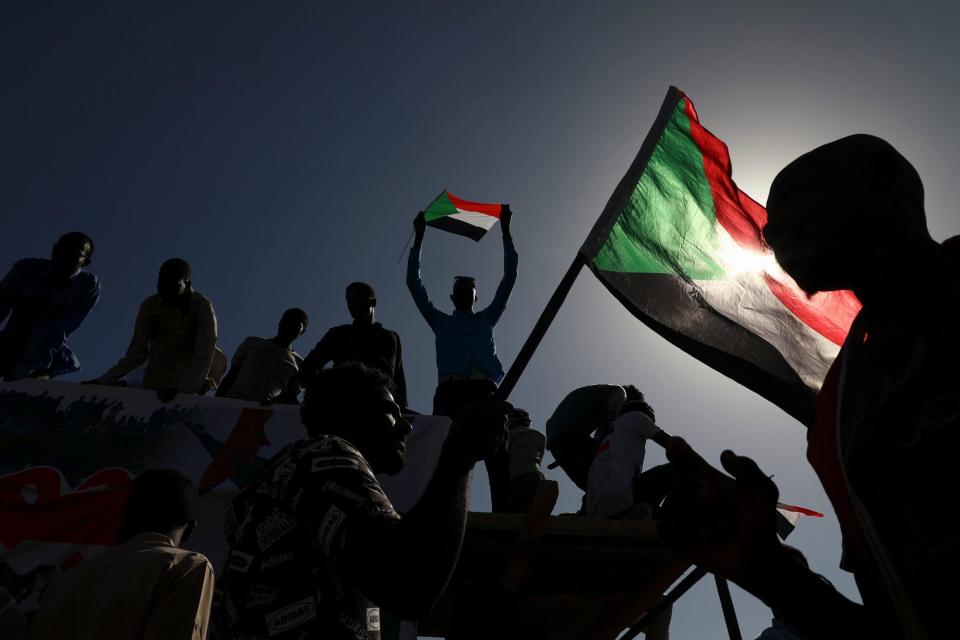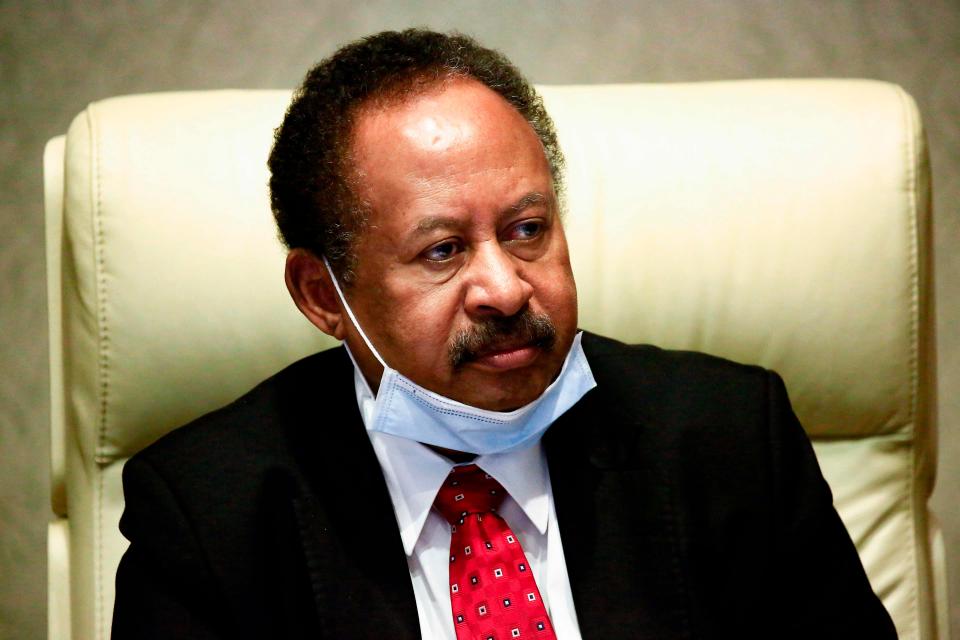'It defies logic.' 9/11 families urge Trump administration to drop deal to take Sudan off terror list
A last-minute appeal from victims of the Sept. 11 attacks could derail a pending Trump administration deal to remove Sudan from the list of state sponsors of terrorism – a designation that lumps it together with North Korea, Iran and Syria.
Sudan's government has tentatively agreed to pay millions of dollars to American victims of the USS Cole attack and the 1998 bombings at two US embassies in Africa. That could pave the way for the Trump administration to remove Sudan from its list of state sponsors of terrorism.
The fight could have far-reaching consequences for hundreds of American families touched by terrorism and the future of Sudan's fledgling democracy.
It comes comes as Sudan is trying to transform from dictatorship to democracy and improve relations with the United States. Last year, Sudanese protesters took to the streets and successfully ousted then-President Omar al-Bashir, whose brutal regime had ruled the country for three decades.
"We are trying to right now strengthen a very young, very fragile democratic transition," said Cameron Hudson, a Sudan expert who served in both the Barack Obama and George W. Bush administrations. Removing Sudan from the State Department's list of state sponsors of terrorism could significantly bolster the country's new civilian-led government, he said.
"For Sudan to move beyond its history, it needs to have this label removed," Hudson said. Sudan's designation as a state sponsor of terrorism is a "vestige" of its past when "they were a bad actor in the region."
Sudan's ambassador to the United States, Nureldin Satti, said delisting Sudan "will remove the stigma brought upon the Sudanese people by the former regime." More importantly, Satti said, it will lift Sudan's troubled economy at a critical moment.
The U.S. terrorism designation has blocked Sudan from fully participating in the global economy, restricting the country's ability to get debt relief and investment from international financial institutions, such as the World Bank and the International Monetary Fund.
But those arguments don't fly with Kristen Breitweiser, whose husband was among the 2,753 people killed in New York City in the Sept. 11 attacks. She said she's been told by State Department officials and lawmakers in Congress that the U.S. needs to nix Sudan's terror designation so the country can rejoin the international community and "sell their oil."

"... It's a little bit hurtful that Sudan's path to capitalism is apparently more important than the 9/11 families' path to justice," Breitweiser said. "Members of Congress and the Trump administration are completely O.K. with throwing the 9/11 families under the bus in restoring Sudan sovereign immunity for the past 30 years."
The question of what role Sudan played in 9/11, if any, is hotly contested.
"Sudan had nothing to do with the Sept. 11 attacks, and we oppose any attempt to link that to the ongoing (de-listing) process," Satti told USA TODAY. "No court has ever found – by default judgment or otherwise – that Sudan had a role in Sept. 11, and we expect that to remain the case."
But James Kreindler, a lawyer who represents some of the 9/11 families, argues that Sudan assisted al-Qaida "in essential and meaningful ways before the Sept. 11 attacks and the country should be "held to account."
"While everyone would love a new democratic government to succeed, what Sudan's leadership did 20 years ago was reprehensible," Kreindler said.
The 9/11 Commission, an independent, bipartisan body that investigated the circumstances surrounding the attacks, noted that Osama bin Laden moved to Sudan in 1991 and set up a "large and complex set of intertwined business and terrorist enterprises."
But amid growing pressure from the US and other countries, Sudanese officials began secret negotiations to expel bin Laden and he returned to Afghanistan in 1996 – five years before the Sept. 11 attacks. The 9/11 report says bin Laden left Sudan with little to show for his time there.
"When bin Ladin left in 1996, it appears that the Sudanese government expropriated all his assets; he left Sudan with practically nothing," the report states. "Nor were bin Ladin's assets in Sudan a source of money for al Qaeda."
Hudson said the 9/11 families' allegations "do not stand up to any scrutiny." But he worries they could impede Sudan's removal from the terrorism sponsor list because they represent such a powerful constituency.
"They're creating a lot of fear among members of Congress who don't want to get crosswise with a very sympathetic and politically active community," he said.
There's little question that lawmakers and Trump administration officials are treading carefully as they try to clinch a deal with Sudan.
For months, Sudan's government has been quietly working with U.S. officials to settle lawsuits stemming the USS Cole attack in 2000 and the bombings at the U.S. embassies in Kenya and Tanzania in 1998. In both cases, the attacks were linked to al-Qaida, the militant group founded by bin Laden.
In February, Sudan announced it had reached a settlement with victims and families of the USS Cole attack in 2000. Seventeen U.S. soldiers were killed in that October 2000 attack, in which two suicide bombers drove a small boat loaded with explosives into the hull of the destroyer as it was refueling in Yemen. Another 39 people were injured.

Under the legal settlement, Sudan did not admit guilt but agreed to pay about $30.6 million to the families of the 17 sailors killed in the attack and $39.4 million to 15 of the sailors who were injured, said Adam Hall, an attorney who represented the plaintiffs in the case.
Hall said the agreement would help bring closure for those devastated by the attack. "To say that Sudan is finally stepping up and willing to put this to bed means a great deal," he told USA TODAY in February.
The 1998 embassy attacks in Nairobi, Kenya, and Dar es Salaam, Tanzania, killed more than 200 people, including 12 Americans, and wounded more than 4,500. The negotiations in that case appear to still be in the works and part of a broader deal.
Satti said Sudan's previous regime did not try to defend itself from either the Cole or embassy bombing lawsuits, leading to default judgments against the country.
"We have already settled many of those default judgments and have an agreement in principle with the United States to settle the remainder," he said. Negotiations "are ongoing," he said, adding that he hopes to have a resolution by the end of September.
Foreign Policy magazine reported that Sudan had agreed to pay as much as $335 million to settle both the Cole and embassy bombing lawsuits. Satti declined to specify the amount but said "the money has been secured."
A State Department spokesperson declined to say when the legal settlement could be finalized or spell out a timeline for Sudan's removal from the terrorism list. This spokesman, who spoke on the condition of anonymity under the agency's policy, said the department is working to make sure 9/11 victims with pending lawsuits are able to pursue claims against Sudan, but he did not specify how.
More: Ex-Sudan President al-Bashir gets two years for money laundering, corruption
Secretary of State Mike Pompeo has publicly voiced support for Sudan's campaign, with caveats.
"This is an opportunity that doesn't come along often," Pompeo said at a July 30 Senate Foreign Relations Committee hearing, referring to the ability to support Sudan's transition to democracy.
Lifting the state sponsor of terrorism designation "would be a good thing for American foreign policy," as long as it comes with compensation for American victims of terror attacks in which Sudan allegedly played a role, Pompeo said.
Once the Trump administration removes Sudan from the list, Congress has 45 days to block the move. But lawmakers also need to proactively restore Sudan's sovereign immunity, which would protect Sudan from future lawsuits.
Sen. Chris Coons, a Delaware Democrat who serves on the Senate Foreign Relations Committee, has been working on legislation to balance Sudan's interests and those of US terror victims, including the 9/11 community. He and others hope to pass the measure before the end of this year.
“We have a once in a generation opportunity to support Sudan’s fragile democratic transition, build a stable security partner at the crossroads of Africa and the Middle East, and secure accountability and compensation for over 700 terror victims and family members," Coons said in a statement to USA TODAY. "It is in the U.S. national security interest to support this cause.”
More: Rihanna highlights Sudan massacre, in which over 100 may have been killed
But Coons and other lawmakers have been besieged with pleas from Breitweiser and other members of September 11th Advocates, a group of widows and other relatives of the victims.
"Why is President Trump exonerating and absolving a nation that has a 30-year track record of actively promoting and supporting Islamic terrorist groups that have killed thousands of innocent Americans – including nearly 3,000 on September 11th?" the group wrote in one email sent to lawmakers.
Breitweiser said State Department officials told them that "Sudan is too poor and there’s too many dead from 9/11" to include them in the agreement. "That's heck of a message to send out as a counter-terrorism policy: 'Go big and you won’t be held accountable'," she said. "It defies logic."
The 9/11 families could still sue Sudan under other federal statutes, but Breitweiser said Sudan's terrorism designation is the strongest legal leverage they have to collect on any potential judgment.
"They didn’t stay on that list for 30 years because they were selling milk and cookies," she said.
Satti said the 9/11 issue "came out as a surprise to us," and Sudan's economy cannot flourish without regaining sovereign immunity from such lawsuits. He said he's optimistic that the matter can be resolved.
"We are working closely with the administration, which is working constructively with members of Congress so that delisting and legal peace can be achieved at the same time," he said.
Contributing: Associated Press

This article originally appeared on USA TODAY: 'It defies logic.' 9/11 families fight deal to take Sudan off terror list
